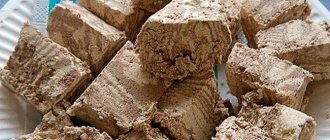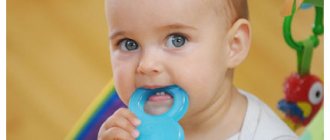What to do when a child spits up like a fountain?
If the baby burps like a fountain for the first time, do not immediately panic and immediately call an ambulance. It is necessary to calmly perform some actions according to the advice of pediatricians:
as soon as this happens, the child should immediately be placed on his side so that the vomit does not enter the respiratory tract;
if the baby burps on himself, he needs to be washed and his clothes changed;
The baby should be given some warm water to drink;
you need to pick up the child vertically and walk around the room with him, lightly stroking his back and calming him down;
As soon as the baby calms down, you should check to see if his temperature has risen or if he has become lethargic (if any extraneous symptoms are detected, you should immediately call a doctor).
Why does a baby spit up - the most common reasons
Babies can regularly burp for a variety of reasons, most of which are not a reason to panic. However, you should understand each of them in detail:
The child simply overeats - infants may not feel their normal limits and eat more than their small body needs. The stomach of such a child does not yet know how to stretch, so excess food is not retained in it. The problem of frequent regurgitation is most often faced by mothers who are accustomed to feeding their babies on demand. It is important to understand that children are often capricious and demand the breast only to be closer to their mother, and not because they are hungry. Even an extra 40 g of milk will not be retained in his tiny stomach, and he will definitely regurgitate it.
During breastfeeding, the baby does not grasp the nipple correctly - because of this, during the feeding process, he swallows not only mother’s milk, but also air, which then “breaks out” with a small amount of food.
The child has increased gas production - because of this, food slowly moves towards the intestines and is simply thrown back through the esophagus. To prevent this from happening, it is necessary to eliminate the problem of colic and flatulence.
The child has congenital pathologies of the central nervous system and gastrointestinal tract - this reason cannot be excluded. To confirm it and begin treatment, the baby must undergo a full medical examination.
The baby has intestinal obstruction - this disease is very serious and requires immediate treatment. The pathology occurs due to the accumulation of feces in the child’s intestines, or the accumulation of original mucus in his stomach. Intestinal obstruction can also be caused by a tumor in the large or small intestine. You can notice the symptoms of this disease yourself: approximately 2-3 hours after feeding, the baby begins to vomit, which contains impurities of bile and mucus. The vomit smells very unpleasant.
Too active behavior of the baby immediately after feeding - perhaps the mother immediately began to play with him, or decides to immediately change his clothes. It is necessary to analyze your own actions after the child has eaten - often the reason for frequent regurgitation lies precisely in them. It is not recommended to expose your baby to active movements, and for at least 20 minutes immediately after eating, he should be calm, preferably in an upright position. If the baby does not hold his head well, you can build a special support for him from a blanket or towel, folded several times (it is placed on the mother’s hand, and the baby himself is placed on top).
If the baby burps in small portions after each feeding, and is very active, gains weight well, does not act up or cry, then regurgitation should not be a cause for concern.
if a child spits up cottage cheese
The most difficult days, of course, were in the RD, despite the fact that my daughter slept almost all the time, I am generally depressed by enclosed spaces, and even more so by those beyond which I cannot go. I counted the days until discharge and thought that we would come home and everything would get better there. Yes, the first three days at home seemed like paradise to me, my husband came home early from work, helped as much as he could, everything seemed fine, but... Life, of course, changes with the birth of a child and I was not very ready for this, to say that in those days I experienced the joy of the birth of a daughter, no, the maternal instinct was sleeping somewhere at that time... I couldn’t take a step without her, anywhere outside the house, I couldn’t go out for a walk alone, I sat at home for almost two weeks... and I began to understand that just a little more would hit me specifically ! Yes, sometimes she cries and I cry with her, but just a little, because for me the main rule by which I now live is: Calm mother, calm baby! I don't allow myself to relax. Now, of course, I go out alone and even go to my parents (they live in another area) I have friends there, communication, that’s what I was missing, take a stroller, go outside and just talk with girls, just look at people and understand that life is boiling around and mine will boil in a year))))).
Mayan.
Now we are 27 days old and I really feel better, my daughter doesn’t cry anymore and feels sorry for her mother. We cry consistently from 10 pm to 11 pm. We have a problem with bathing, the child just starts going hysterical, as if you put her in some water, she lies there looking attentively, and as soon as you start washing her tears away with hail, so this procedure takes us about 2 minutes !!! I do not know what to do!
Who said that children at this age should sleep 20 hours!? We sleep little! During the day we can go 4 hours without sleeping at all, well, he’ll close his eyes for 20 minutes and that’s it! She can lie there for an hour and look at the ceiling or look at the wallpaper, and still be absolutely calm! On a walk, too, when he sleeps, when he doesn’t, he rides in his stroller and looks at the walls!!! At night we sleep for the first three hours, then we wake up every two hours, or we can wake up every hour and so on until 9 am!
We also suffer from stomach problems, we have gas cars. Today, since 3 am, we haven’t been sleeping, we’re groaning terribly, we’re farting, we’re eating medicine, but nothing really helps us, it’s probably because I ate ice cream at night yesterday, we’re completely on breastfeeding. By the way, we are also on a diet, after such nights it’s scary to experiment with food, but what’s more, it’s scary to eat!!! And our poop became green all the time, I called the doctor, she said either the child is not eating enough or it is an infection... we are going to an appointment today! We poop very often, by the way, about 7 times a day, every time I have to wash it, but the butt is still red, the powder seems to help... After every feeding (except at night) we burp, sometimes very heavily, sometimes like curds, and several times it was all over my nose... What's wrong? I don’t know what to do with this, it seems that all children spit up, so I don’t sound the alarm.
In general, we have grown up, we have already taken out 62 cm bodysuits, they almost fit us... Cheeks have appeared))))
Well, a little about us))))
What is regurgitation?
Neonate regurgitation, sometimes called physiological or uncomplicated reflux, is common in babies and is usually (but not always) normal.
Most young babies spit up occasionally because their digestive systems are immature, allowing stomach contents to return to the esophagus.
Many newborns and infants spit up some of their mother's milk or formula during or shortly after feeding. Some babies spit up only occasionally, while others spit up after every feeding.
The baby often spits up after feeding when he receives a lot of milk in a short period of time. This happens when the baby suckles very quickly and forcefully or when the mother's breasts are too full.
When a baby is often distracted (pulling the breast to look around) or fussing at the breast, he swallows air and therefore will burp more often. Some babies spit up more when they start teething, crawling, or eating solid foods.
Several statistics
- The child vomits curdled milk immediately after eating. But it happens that the baby spits up an hour after feeding;
- half of all children under 3 months burp at least once a day;
- regurgitation usually peaks at 2 to 4 months;
- many children outgrow this condition by 7–8 months;
- Most babies stop spitting up by 12 months.
When a baby spits up milk, this is not a cause for concern. The fact that the baby regurgitates a curdled mass is explained by the action of an enzyme contained in the stomach juice. The enzyme is responsible for preparing food for the next stages of digestion.
Common situations
If, after feeding, a newborn regurgitates like a fountain, parents are very scared of this phenomenon. In any case, there is no point in panicking. First of all, you need to understand what the reason is:
- the child spits up like a fountain, due to prematurity and slow functioning of the digestive system;
- when switching from breastfeeding to artificial feeding, the baby may begin to spit up like a fountain. Perhaps parents just need to change the formula. If the child continues to spit up profusely, you should consult a doctor;
- Gastrointestinal colic can also cause the baby to spit up. In this case, mom and dad need to be patient and wait out this difficult period;
- rarely, but it happens that the reason for regurgitation in a fountain lies in the deformation of the internal organs. In this case, immediate medical attention is necessary.
Of course, any parent will wonder why a newborn baby spits up like a fountain. If this has been going on for a long time, tell your pediatrician about it.
When a baby spits up a mass that resembles curdled milk or cottage cheese, there is no reason for parents to worry. This phenomenon is absolutely normal.
If a mother is concerned about the baby's frequent but not excessive regurgitation, it is most likely worth reconsidering the feeding regimen, since overfeeding is often the reason for this. If your baby continues to spit up, you should consult a pediatrician.
Why does a child burp often?
Drinking large amounts of foremilk
This is a common reason why a baby spits up. During breastfeeding, breast milk changes in consistency and composition.
At first, the milk is more watery and rich in lactose. Later, the milk becomes richer and more nutritious. Accordingly, as the baby eats, the amount of fat in human milk increases.
It is possible that the baby is constantly spitting up because he is receiving more foremilk.
This can happen if a nursing mother takes too long a break between feedings and the amount of foremilk in the mammary glands increases.
Why does a child spit up like a fountain?
If your baby spits up frequently and a lot, he may have the following conditions that require medical attention.
If your baby spits up like a fountain, he may have a condition called gastroesophageal reflux disease (GERD).
Symptoms:
- frequent regurgitation or vomiting;
- discomfort when regurgitating.
It happens that the child does not burp in the full sense of the word, but quiet reflux occurs. This is a phenomenon in which the contents of the stomach only reach the esophagus and are then swallowed again, causing pain.
Signs of severe reflux:
- the child cries a lot during feeding, it is impossible to calm him down;
- poor weight gain or loss;
- refusal to eat;
- difficulty swallowing, hoarseness, chronic nasal congestion, chronic ear infections;
- regurgitation that is yellow or mixed with blood.
Pyloric stenosis
A condition in which the muscles at the bottom of the stomach harden and prevent food from passing into the small intestine. Fountain regurgitation in newborns in combination with underweight are clear signs of pyloric stenosis.
And it affects more boys than girls. This usually occurs in infants at about 1 month. Pyloric stenosis requires surgical correction.
Intestinal obstruction
If there is green bile in your baby's regurgitation, this is one sign of a blockage in the intestines, which will require an emergency room visit, a scan, and possibly emergency surgery.
Disorders of the central nervous system
Disturbances in the functioning of the central nervous system are also the answer to the question of why a newborn spits up like a fountain.
Infection
After the first months of life, the most common cause of regurgitation is a stomach or intestinal infection. Viruses are the most common infectious agents, but sometimes bacteria and even parasites can be the cause. The infection can cause fever, diarrhea, and sometimes nausea and abdominal pain.
Rotaviruses are the leading cause of regurgitation in infants and young children, with symptoms often progressing to diarrhea and fever.
Rotavirus is one of the viral causes of gastroenteritis, but other types of viruses such as noroviruses, enteroviruses, and adenoviruses can also cause this condition.
Sometimes infections outside the gastrointestinal tract cause regurgitation. These are infections of the respiratory system, ear infections, and urinary system.
Some of these conditions require immediate medical treatment. So be vigilant no matter your child's age and call your pediatrician if:
- blood or bile in vomit and regurgitation;
- severe abdominal pain;
- persistent, repeated fountain regurgitation;
- a swollen or visually enlarged abdomen;
- lethargy or severe irritability of the baby;
- convulsions;
- signs or symptoms of dehydration - dry mouth, lack of tears, recessed fontanel and decreased amount of urination;
- prolonged vomiting for more than 24 hours in a row.
What to do if a child spits up?
- If your baby spits up frequently, change your feeding position to a more upright position. Gravity will play a role in retaining milk in the stomach if the baby is held upright for about half an hour after feeding.
- Avoid any vigorous activity immediately after eating. This may cause the baby to burp.
- Provide a calm and relaxed atmosphere during feeding. Don't leave your baby very hungry before you start feeding him. A hungry and anxious baby may swallow a lot of air, increasing the chances of breast milk reflux.
- Feed your baby in small portions, but more often, to avoid an overfilled tummy.
- Avoid overfeeding your baby.
- Have your baby burp as often as possible to get rid of any air that might be absorbed from the food. If you don't see a burp after a few minutes, don't worry. Your baby may not need this.
- The child should be placed to sleep on his side or back, and not on his stomach. If your baby spits up during sleep, keep his head elevated.
- Don't put pressure on your stomach. Loosen any tight clothing, and do not place your baby's stomach on your shoulder so he can burp.
- Eliminate certain foods from your diet to see if the problem of frequent spitting up resolves.
What to do if your baby spits up an hour after eating?
When a baby spits up after feeding, you must adhere to the following rules:
- ensure that the baby swallows the nipple along with the areola (this prevents air from being swallowed);
- When feeding, the baby's body should be held at an angle of 60 degrees;
- When feeding from a bottle, fill the nipple completely;
- If an hour after eating the baby begins to burp and hiccup, give him some water.
It happens that a baby burps several times at intervals. This situation can be quite dangerous, since if the child lies alone in the crib, he may choke on the regurgitated mass. Therefore, after feeding, it is necessary to help the baby burp:
- Before eating, place the baby on his tummy. Even better is to give him a stroking massage in a circular motion.
- Do not put the baby down after feeding. Keep it in a vertical position (“column”) for 10–15 minutes.
- Make sure that clothes do not squeeze your tummy. Do not swaddle tightly before eating.
- You need to feed your baby with his nose cleaned in advance. While eating, the baby should not breathe through his mouth. This will help prevent air from entering the gastrointestinal tract.
Also, do not forget that physical activity has a great effect on the development of the gastrointestinal tract. At 1 month of age, circular movements of the arms and legs, as well as massage, are ideal.
From the age of three months you can start exercising in water: while bathing, let the child lie in the water, twitch his arms and legs and splash around.
Another reason why a baby spits up curds may be the mother’s diet. She needs to carefully watch what she eats. It is necessary to exclude legumes, brown bread, oranges, apples and other foods that cause flatulence from the list of products. You also need to make sure that they are fresh, and feel free to throw in the trash anything that arouses suspicion!
When is a doctor needed?
Frequent regurgitation in newborns is a process that almost any mother can cope with. But in some cases treatment is necessary.
If the child constantly burps or the amount, smell or color of the regurgitation has changed, contact a specialist. First of all, visit your pediatrician. Then he can refer you to a gastroenterologist, neurologist, or surgeon.
Do not delay a visit to the doctor if the child spits up heavily and then screams or squirms. This behavior may mean that the baby's esophageal walls are irritated.
Increased attention is required if the regurgitation looks like a fountain, occurs after each feeding, or looks like vomiting and after it the body temperature rises.
Don’t take unnecessary risks, show your child to a specialist.
Sometimes regurgitation is so frequent that the child does not gain as much body weight as necessary. This is much more important and may require special tests and more aggressive treatment. If testing confirms gastroesophageal reflux, treatment may include gentle feeding techniques and possibly medications.
Some medications, such as ranitidine, help neutralize stomach acids and protect the sensitive lining of the esophagus, which is exposed to stomach acid due to regurgitation. Others, such as Omeprazole or Lansoprazole, stimulate the stomach to move food into the intestines more quickly.
Baby spitting up is one of the most important and sometimes confusing issues you will face as a parent. The recommendations in this article are general in nature and apply to infants in general. Remember that your child is unique and may have special needs. If you have questions, ask your pediatrician to help you find answers that apply specifically to your baby.
Most families with a newborn baby are faced with the problem of regurgitation. This phenomenon frightens parents because it is very similar to vomiting. However, regurgitation is often not associated with pathological processes and is quite acceptable in infancy. Why does a newborn spit up? Is there anything I can do to help him? Let's discuss.
Is it normal for a baby to spit up?
Yes, there is nothing criminal about this, and, with the exception of special cases, regurgitation is considered a physiological process. More than 70% of infants experience this phenomenon before the age of six months.
Regurgitation is the release of small portions of undigested or semi-digested food (most often mother's milk) from the stomach. If the baby is not capricious, smiles and is gaining weight well, you don’t have to worry too much. But when the baby behaves restlessly, loses weight over time, and spits up constantly like a fountain, be sure to consult a doctor as soon as possible. We'll discuss why this happens a little later.
Either vomiting or regurgitation
Every mother needs to be able to distinguish between these two conditions, because our further actions will depend on what we are faced with.
Regurgitation
|
As you can see, vomiting is a phenomenon that brings with it spasms and pain; a child will never be cheerful in such a state, while he may not particularly react to regurgitation.
The main reasons for regurgitation of curdled milk or formula
First you need to find out whether the baby is actually regurgitating milk that has been curdled in the stomach or is vomiting. This can be determined by the following signs:
- Regular regurgitation does not cause contraction of the abdominal muscles. The discharge does not have an unpleasant odor, is very similar to curdled milk or cottage cheese, and occurs shortly after feeding. The frequency of regurgitation does not exceed 2-3 times a day, the child feels normal.
- vomit is more abundant, the breaks between them are accompanied by active secretion of saliva. Due to the admixture of bile and gastric juice, they have a yellowish tint. The frequency of vomiting depends little on food intake, the skin becomes pale, the baby is capricious, and signs of poisoning are observed.
Causes of regurgitation
The digestive system of a newborn baby is in the formative stage, and this is the main factor that the baby often spits up. Here are some reasons why this phenomenon occurs:
- Binge eating . As Winnie the Pooh's friend, Smart Rabbit, said: "It's all because someone eats too much." It's no secret that sucking a mother's breast gives the baby a feeling of security and love. This state is so comfortable that even after eating, the baby does not want to leave the breast. Because of this “attachment,” the child may drink too much. But the stomach knows its norms, and regurgitation becomes a defensive reaction. In babies who are bottle-fed, a similar picture may be observed due to the fact that the standard dose from a bottle is too much.
- Air and food. It is not uncommon for air bubbles to get in with the food during feeding. This occurs due to improper attachment to the breast, or the awkward position of the child while eating. If feeding from a bottle, the hole in the nipple may be too large, and the milk (formula) flows out under great pressure.
- Flatulence. A child receiving breast milk also consumes substances from the foods that the mother ate the day before. And if the foods included legumes, cabbage, fresh apples, brown bread, it is quite possible that there was increased gas formation, causing, in addition to cramps, an increase in intra-abdominal pressure. As a result, the baby may burp.
- Weak sphincter muscles. They will be formed during the first 6 months of life. In the meantime, the untrained muscle “passes” the contents that entered the stomach back.
- Overexcitement. This reason, although rarely leads to regurgitation, has a right to exist.
- Teething . This way the body gets rid of excess saliva.
The concept and causes of regurgitation in infants
So what is regurgitation? Regurgitation is a type of vomiting in children of the first year of life. This happens due to undeveloped gastric muscles .
Normally, regurgitation occurs immediately after feeding , sometimes with belching, in small portions (no more than 20 ml). The milk or mixture comes out unchanged or curdled. Sometimes a child burps up to 7-8 times a day.
Komarovsky always says that if a baby is gaining weight well and behaves normally, then it is not he who is sick, but his caring parents.
So, we need to understand this issue in more detail.
Komarovsky clearly divides the reasons why infants regurgitate into natural causes and into causes due to pathologies.
The most common cause of regurgitation in babies is banal overfeeding . If the baby eats more than the prescribed amount, the stomach stretches and a spasm occurs, which leads to regurgitation.
Everyone knows that there is a problem with colic in infancy. So, colic provokes regurgitation.
If the baby is breastfed, the cause of regurgitation may be improper attachment to the breast. During feeding, the baby swallows small portions of air along with the milk, and then these air bubbles rise up the esophagus along with the milk, and the baby burps. The same picture can be observed during bottle feeding.
“If after feeding the baby is shaken sharply, tossed (which young dads really like to do), given a massage, bathed, then the baby is 100% likely to burp.
Regurgitation may cause rejection of the selected formula. Well, this mixture is not suitable for a child. Or have allergic reactions to protein or lactose.
It happens that a child has a high tone of the vomiting center, which is also a variant of the norm.
In any case, you need to remember that when regurgitating for natural reasons, the baby does not lose weight, and the child’s well-being is excellent, and general health indicators are normal .
Komarovsky considers pathological causes of regurgitation in infants primarily as a pediatrician. The most important thing is that if regurgitation is pathological, you need to consult a doctor in time , he will prescribe adequate treatment.
When the causes of regurgitation are pathological, it causes many problems and unpleasant moments. It happens that a child spits up like a fountain, it already looks like vomiting. And if treatment is not started in time, the baby will begin to lose weight, dehydration may quickly occur, and the baby may choke on vomit, especially if he is premature.
But you still need to take a closer look at the pathologies that cause regurgitation:
- The most common pathological cause remains perinatal encephalopathy . Encephalopathy usually occurs from lack of oxygen and various injuries during childbirth.
- Congenital abnormalities in the development of the gastrointestinal tract or hernias of various origins.
- Neurological problems caused by difficult childbirth and congenital birth defects (for example, intracranial pressure).
- Various infectious diseases (meningitis, sepsis).
- Congenital metabolic disorders.
- Kidney disorders.
- And, as a rule, poisoning with toxic substances .
Pathological regurgitation
If a month-old baby burps frequently, profusely, and loses body weight, be sure to show the baby to the doctor. Such symptoms may indicate the development of a serious illness.
- Pathology of the digestive organs. For example, an anomaly such as pyloric stenosis appears already in the first weeks of life. With it, the child regurgitates curds, body weight decreases, and there are no fecal formations even after the enema. If surgery is not performed in a timely manner, the baby may die.
- Pathology of the central nervous system. Occurs during difficult childbirth, fetal hypoxia, underdevelopment of the central nervous system in premature infants. In such cases, the child burps violently, literally like a fountain, sleeps restlessly, and the head may tilt back. The contents are undigested milk or formula.
- Lactose intolerance. A baby may spit up a lot due to lactose intolerance to the milk protein. Some people are born without the enzyme lactase, which is involved in the digestion of milk. In this case, the baby is transferred to a lactose-free formula and, unfortunately, breast milk becomes contraindicated for him.
- Infection . This may include food poisoning, meningitis, etc. A common accompanying symptom is high fever, pale or yellow skin. Regurgitation with mucus indicates that the infection is localized in the gastrointestinal tract, or dysbiosis is to blame.
- Kidney failure. Sometimes regurgitation after eating can be not only due to overeating, but also due to kidney problems.
In all these cases, the child needs emergency medical care, since all of these diseases are quite serious. Summarize. Medical help is sought in the following situations:
- frequent regurgitation, more than twice a day;
- the baby refuses to eat, pees little or too much, is lethargic, body temperature is low (signs of dehydration);
- very high temperature, little or no weight gain;
- the evacuated contents look like sour milk, not white in color, with an unpleasant pungent odor.
So, regurgitation of a yellow color, like a fountain, will indicate that the condition is similar to vomiting with bile impurities. Curds indicate that the digestion process has begun, but there are certain disruptions in the digestive system. If such symptoms occur periodically, and the baby is cheerful and cheerful, they are not scary. But if the contents are brown or green, this is a very alarming signal, intestinal obstruction is possible and you need to see a doctor immediately!
Why does a child sometimes burp through his nose? The force of the push and the large amount of contents lead to the vomit looking for all possible exits (not only through the mouth, but also through the nose).
Pathological causes
If relapses occur too often and the baby begins to lose weight, then it is worth showing the child to a specialist and finding out why the baby is spitting up. In some cases, this indicates health problems:
- Gastrointestinal diseases. For example, pyloric stenosis. The first symptoms of the disease appear as early as 1 month: absence of feces, sharp decrease in body weight, cheesy regurgitation. At the first suspicion of illness, the baby should be shown to a doctor.
- Diseases of the central nervous system. Occurs in children who were born during problematic labor and in premature babies. Another reason may be fetal hypoxia. Symptoms: gushing regurgitation (curdy consistency), restless sleep, throwing the head back.
- Infectious diseases. In this case, the symptoms depend on the disease itself. But common signs are fever and pale skin. The presence of mucus in regurgitated masses indicates the presence of infection in the gastrointestinal tract.
Lactase intolerance should also be mentioned separately. This indicates that the child lacks the lactase enzyme and his body is completely unable to digest milk. Unprocessed residues may regurgitate out. In this case, the baby is transferred to lactose-free bottle feeding.
Learning to reduce the frequency of physiological regurgitation
How can you help your child without waiting 6 months for the condition to normalize on its own? There are several simple techniques:
- After feeding, always take time to carry your baby upright until you hear a burp. This will take up to 10 minutes.
- While eating, make sure that the baby latches onto the breast correctly (the nipple with the surrounding halo). When artificial feeding, the hole in the nipple should correspond to the age of the toddler, that is, a nipple with a small hole is suitable for newborns. In addition, there are special anti-colic bottles that prevent air from entering the stomach.
- How long should you keep your baby at your breast? Let this happen more often, but experiment with taking your breasts a little earlier than usual. When babies are full, they suck less intensely and often begin to fall asleep at the breast.
- Keep your spout clean. Difficult nasal breathing leads to the baby swallowing air during feeding.
- Do not feed while crying excessively.
- Safety measures: when putting your child to sleep, place him on his side and secure the position with bolsters.
- Refrain from active play after feeding. There is no need to throw the baby up and, especially, to do exercises.
Important! A baby who has just eaten should not be left lying on his back unattended. There is a risk that the child may choke on vomit.
Caring for young children is always accompanied by concern for their life and health. And such fear is quite acceptable, because it encourages us, parents, to respond to warning signs in a timely manner and help our children. Just do not worry too much, since almost every child spits up during the newborn period, but this does not in any way affect his development and health.








